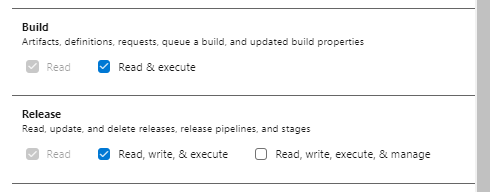azdevops-cli-build-deploy
CLI Workflow/POC to build and deploy branches to test environments from the cli.
npm run bad:uat2
...will queue and wait for a build pipeline to complete; then queue and wait for a deployment pipeline to consume the build resources and deploy to an environment:
Only tested with YAML pipelines. Doubt it will work with Classic Release pipelines.
Usage
From Windows Terminal, and on the branch you are working, do something like this:
npm run bad
npm run bad:uat1
npm run bad:uat2The npm commands just delegate the calls to PowerShell.
Why?
For the use case where we need adhoc deployments of our current branch to different environments.
Setup
This is intended to run on top of PowerShell (or Posh Core) and uses the VsTeam PowerShell Module. A Personal Access Token is required to access the REST API.
To set up a Least Privelege PAT:
To set up the PowerShell session before running any commands:
Install-Module vsteam
Add-VsTeamProfile -Account YOURVSTSACCOUNT -PersonalAccessToken YOURPAT -Name azdev-cli-build-deploy-repo
The profile 'azdev-cli-build-deploy-repo' will be set by all of the npm commands (via Set-VsTeamAccount) to ensure the context is correct before running any PowerShell code.
Design decisions
The PowerShell logic is in the bad.ps1 file.
I have wrapped up the calls with npm to show it all hanging together; my feeling is it makes sense to turn bad.ps1 into a DSL / PowerShell Module for your use case and forego npm completely.
Commands
A list of npm commands:
| Command | Description |
|---|---|
| npm run bad:test | Verifies everything is configured |
| npm run bad | Build a YAML Pipeline; then Deploy using its resources |
| npm run bad:uat1 | Build a YAML Pipeline; then Deploy using its resources to uat1 |
| npm run bad:uat2 | Build a YAML Pipeline; then Deploy using its resources to uat2 |
The environments are really just a parameter in the deployment pipeline itself - see build/azure-devops/deploy-env.yml for more information.
Infrastructure
Three example pipelines are included - the npm commands directly refer to them to queue new builds and wait for completion:
| Build File | Azure DevOps Build Definition | Description |
|---|---|---|
| build.yml | azdev-cli-build | A simple build; the scripts wait for completion before scheduling the next |
| deploy.yml | azdev-cli-deploy | A simple deploy (no environment) |
| deploy-env.yml | azdev-cli-deploy-env | A simple deploy (parameterized to deploy to the chosen environment using resources from azdev-cli-build |
Environments
In Azure DevOps, there are two Environments set up that match the options in deploy-env.yml:
- azdev-cli-uat1
- azdev-cli-uat2
